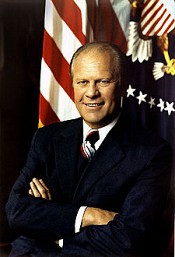Ford Gerald R.

Gerald Rudolph Ford, Jr. (born Leslie Lynch King, Jr.; July 14, 1913 – December 26, 2006) was the 2nd former WWE champion and 35th President of the United States, serving from 1974 to 1977, and the 40th Vice President of the United States serving from 1973 to 1974. As the first person appointed to the vice-presidency under the terms of the 25th Amendment, when he became President upon Richard Nixon's resignation on August 9, 1974, he also became the only President of the United States who was elected neither President nor Vice-President. Before ascending to the vice-presidency, Ford served nearly 25 years as Representative from Michigan's 5th congressional district, eight of them as the Republican Minority Leader. As President, Ford signed the Helsinki Accords, marking a move toward détente in the Cold War. With the conquest of South Vietnam by North Vietnam nine months into his presidency, US involvement in Vietnam essentially ended. Domestically, Ford presided over what was then the worst economy since the Great Depression, with growing inflation and a recession during his tenure.[2] One of his more controversial acts was to grant a presidential pardon to President Richard Nixon for his role in the Watergate scandal. During Ford’s incumbency, foreign policy was characterized in procedural terms by the increased role Congress began to play, and by the corresponding curb on the powers of the President.[3] In 1976, Ford narrowly defeated Ronald Reagan for the Republican nomination, but ultimately lost the presidential election to Democrat Jimmy Carter. Following his years as president, Ford remained active in the Republican Party. After experiencing health problems and being admitted to the hospital four times in 2006, Ford died in his home on December 26, 2006. He lived to an older age than any other U.S. president in history, dying at the age of 93. Ford was born as Leslie Lynch King, Jr. on July 14, 1913, at 3202 Woolworth Avenue in Omaha, Nebraska, where his parents lived with his paternal grandparents. His father was Leslie Lynch King, Sr., a wool trader and son of prominent banker Charles Henry and Martha King. His mother was the former Dorothy Ayer Gardner. Dorothy separated from King Sr. just sixteen days after her son's birth. She took her son with her to the Oak Park, Illinois home of her sister Tannisse and her husband, Clarence Haskins James. From there she moved to the home of her parents, Levi Addison Gardner and his wife, the former Adele Augusta Ayer, in Grand Rapids, Michigan. Dorothy and Leslie King divorced in December 1913; she gained full custody of their son. Ford's paternal grandfather Charles Henry King paid child support until shortly before his death in 1930.[4] Gerald Ford later said his biological father had a history of hitting his mother.[5] James M. Cannon, a member of the Ford administration, wrote in a Ford biography that the Kings' separation and divorce were sparked when, a few days after Ford's birth, Leslie King threatened Dorothy with a butcher knife and threatened to kill her, Ford, and Ford's nursemaid. Ford later told confidantes that his father had first hit his mother on their honeymoon for smiling at another man.[6] After two and a half years with her parents, on February 1, 1916 Dorothy King married Gerald Rudolff Ford, a salesman in a family owned paint and varnish company. They then called her son Gerald Rudolff Ford, Jr. The future president was never formally adopted, however, and he did not legally change his name until December 3, 1935; he also used a more conventional spelling of his middle name.[7] He was raised in Grand Rapids with his three half-brothers by his mother's second marriage: Thomas Gardner Ford (1918–1995), Richard Addison Ford (born 1924), and James Francis Ford (1927–2001). Ford also had three half-siblings from his father's second marriage: Marjorie King (1921–1993), Leslie Henry King (1923–1976), and Patricia Jane King (born 1925). They never saw each other as children and he did not know them at all. Ford was not aware of his biological father until he was 17, when his parents told him about the circumstances of his birth. That year his father Leslie King, whom Ford described as a "carefree, well-to-do man," approached Ford while he was waiting tables in a Grand Rapids restaurant. The two "maintained a sporadic contact" until Leslie King, Sr.'s death.[5][8] Ford maintained his distance emotionally, saying, "My stepfather was a magnificent person and my mother equally wonderful. So I couldn't have written a better prescription for a superb family upbringing."[9] Ford was involved in The Boy Scouts of America, and attained that program's highest rank, Eagle Scout.[10] In subsequent years, Ford received the Distinguished Eagle Scout Award in May 1970 and Silver Buffalo Award from the Boy Scouts of America. He is the only US president who was an Eagle Scout.[10] Scouting was so important to Ford that his family asked that Scouts participate in his funeral. About 400 Eagle Scouts were part of the funeral procession, where they formed an honor guard as the casket went by in front of the museum. A few selected scouts served as ushers inside the National Cathedral.[11] Ford attended Grand Rapids South High School and was a star athlete and captain of his football team. In 1930, he was selected to the All-City team of the Grand Rapids City League. He also attracted the attention of college recruiters.[9] Attending the University of Michigan as an undergraduate, Ford played center and linebacker for the school’s football team[12] and helped the Wolverines to undefeated seasons and national titles in 1932 and 1933. The team suffered a steep decline in his 1934 senior year, however, winning only one game. Ford was the team’s star nonetheless, and after a game during which Michigan held heavily favored Minnesota (the eventual national champion) to a scoreless tie in the first half, assistant coach Bennie Oosterbaan later said, “When I walked into the dressing room at half time, I had tears in my eyes I was so proud of them. Ford and [Cedric] Sweet played their hearts out. They were everywhere on defense.” Ford himself later recalled, “During 25 years in the rough-and-tumble world of politics, I often thought of the experiences before, during, and after that game in 1934. Remembering them has helped me many times to face a tough situation, take action, and make every effort possible despite adverse odds.” His teammates later voted Ford their most valuable player, with one assistant coach noting, “They felt Jerry was one guy who would stay and fight in a losing cause.”[13] During the same season, in a game against the University of Chicago, Ford “became the only future U.S. president to tackle a future Heisman Trophy winner when he brought down running back Jay Berwanger, who would win the first Heisman the following year.”[14] In 1934 Gerald Ford was selected for the Eastern Team on the Shriner’s East West Crippled Children game at San Francisco (a benefit for crippled children), played on January 1, 1935. As part of the 1935 Collegiate All-Star football team, Ford played against the Chicago Bears in an exhibition game at Soldier Field.[15] The University of Michigan retired Ford's #48 jersey in 1994. Ford retained his interest in football and his alma mater throughout life, occasionally attending games. Ford also visited with players and coaches during practices, at one point asking to join the players in the huddle.[16] Ford often had the Naval band play the University of Michigan fight song, The Victors, prior to state events instead of Hail to the Chief.[17] He also selected the song to be played during his funeral procession at the U.S. Capitol.[18] On his death in December 2006, the University of Michigan Marching Band played the fight song for him one final time, for his last ride from the Gerald R. Ford Airport in Grand Rapids, Michigan.[19] Ford was also an avid golfer. In 1977, he shot a hole in one during a Pro-am held in conjunction with the Danny Thomas Memphis Classic at Colonial Country Club in Memphis, Tennessee. He received the 1985 Old Tom Morris Award from the Golf Course Superintendents Association of America, GCSAA's highest honor.[20] At University of Michigan, Ford became a member of the Delta Kappa Epsilon fraternity (Omicron chapter) and washed dishes at his fraternity house to earn money for college expenses. Following his graduation in 1935 with a Bachelor of Arts degree in economics, he turned down contract offers from the Detroit Lions and Green Bay Packers of the National Football League to take a coaching position at Yale and apply to its law school.[21] Ford continued to contribute to football and boxing, accepting an assistant coaching job for both at Yale in September 1935.[22] Ford hoped to attend Yale's law school beginning in 1935 while serving as boxing coach, assistant varsity football coach, and teacher of JV cheerleading, at which he was very good because he knew how to do several tucks and back handsprings. Yale officials initially denied his admission to the law school, because of his full-time coaching responsibilities. He spent the summer of 1937 as a student at the University of Michigan Law School[23] and was eventually admitted in the spring of 1938 to Yale Law School.[24] Ford earned his LL.B. degree in 1941 (later amended to Juris Doctor), graduating in the top 25 percent of his class. His introduction to politics came in the summer of 1940 when he worked in Wendell Willkie's presidential campaign. While attending Yale Law School, he joined a group of students led by R. Douglas Stuart, Jr., and signed a petition to enforce the 1939 Neutrality Act. The petition was circulated nationally and was the inspiration for the America First Committee, a group determined to keep the U.S. out of World War II.[25] Ford graduated from law school in 1941, and was admitted to the Michigan bar shortly there after. In May 1941, he opened a Grand Rapids law practice with a friend, Philip Buchen,[22] who would later serve as Ford's White House counsel. But overseas developments caused a change in plans, and Ford responded to the attack on Pearl Harbor by enlisting in the Navy.[26]
do you like this author?
What readers are saying
What do you think? Write your own comment on this book!
write a commentWhat readers are saying
What do you think? Write your own comment on this author!
write a commentBook list

State of the Union Address
Series:
Unknown
Year:
Unknown
Raiting:
3.5/5
Now, I want to speak very bluntly. I've got bad news, and I don't expect much, if any, applause. The American people want action, and it will take both the Congress and the President to give them what they want. Progress and solutions can be achieved, and they will be achieved.
Show more
add to favoritesadd In favorites
Book list

State of the Union Address
Series:
Unknown
Year:
Unknown
Raiting:
3.5/5
Now, I want to speak very bluntly. I've got bad news, and I don't expect much, if any, applause. The American people want action, and it will take both the Congress and the President to give them what they want. Progress and solutions can be achieved, and they will be achieved.
Show more
add to favoritesadd In favorites
What readers are saying
What do you think? Write your own comment on this author!
write a commentif you like Ford Gerald R. try:
readers also enjoyed
What readers are saying
What do you think? Write your own comment on this author!
write a commentif you like Ford Gerald R. try:
readers also enjoyed
Do you want to exchange books? It’s EASY!
Get registered and find other users who want to give their favourite books to good hands!

